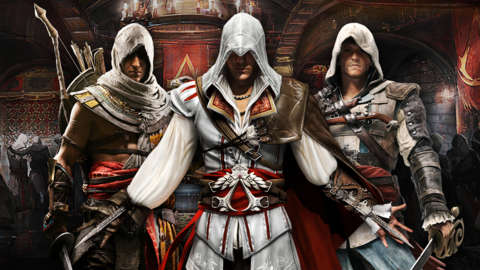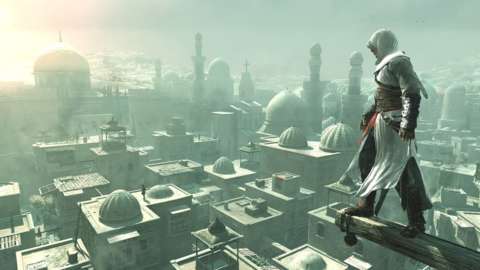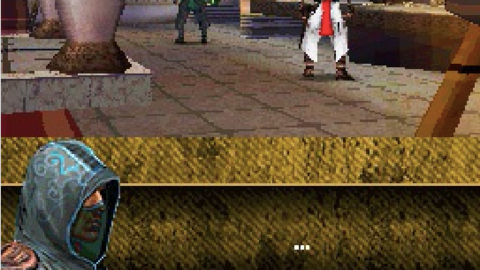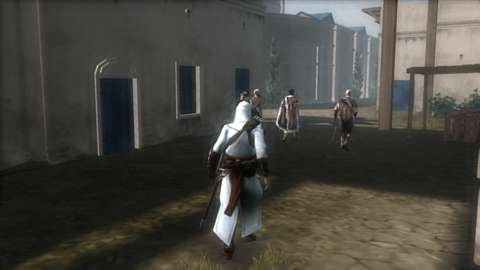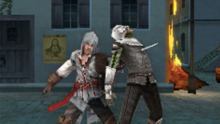On first blush, Assassin's Creed Mirage feels delightfully familiar, delving into storylines and gameplay moments that are reminiscent of the earliest games in the franchise. Having only played about three hours of the game, it's still too soon for me to make a definitive call on how the whole experience will play out overall, but it certainly feels like fans who have been waiting for a return to the series' smaller scale formula may finally be getting what they want with Mirage. There's a heavy dose of Assassin's Creed Unity injected into Mirage's veins and Assassin's Creed Odyssey's detective-driven hunt for the Cult of Kosmos informs Mirage's Order of Ancients assassination missions, but, despite these more modern gameplay additions, this game feels closest to the first game in the franchise.
As the latest mainline game in the 15-year-old action-adventure series, Assassin's Creed Mirage sees you play as Basim Ibn Ishaq, a young thief who joins an army of trained killers who vow to protect the freedom of humanity from those who wish to take it away. Taking place in 9th-century Baghdad, Mirage features the return of social stealth, a smaller map size, and a singular playable protagonist. Some of the series' newer RPG elements (like roleplaying an encounter or unlocking new abilities via a skill tree) make a return, but they are much smaller in scope--no branching, choice-driven dialogue like in Odyssey or a constellation-sized assortment of perks and skills like in Valhalla.
"By [not including] the RPG aspects from the three previous games and the large RPG aspect in the role-playing sense, it allows us to focus a little bit more on the micro-actions," Assassin's Creed Mirage world and quest director Simon Arseneault told me. "Making a condensed game allows us to make more detailed experiences as well, so we can go in and make finer quest lines with more dialogue, or sometimes make [storylines] live a little bit and create custom characters for them."
In my time with Mirage, I got to play through three different parts of the game. First, I played through what's likely the first level of the game, with Basim living as a talented street thief, yearning to be a part of the Assassin Brotherhood's precursors, the Hidden Ones. All the trademark narrative set-up for an Assassin's Creed game is on full display in this first part. Basim is a cocky and brash individual who's good at climbing and has at least one dead parent, just like every Assassin's Creed protagonist that predates him. After playing through that introduction, the preview skipped ahead to Basim's early training days with the Hidden Ones before then skipping even further ahead to a story mission where he's tracking down one of the leaders of the Order of Ancients, the precursor to the Templar Order.
The final part of the preview was my favorite. Being let loose in an open-world city with a main objective to pursue and side missions aplenty is my ideal Assassin's Creed experience. I didn't have enough time to explore the entire city of Baghdad (it's pretty big) but a quick glance at the map did remind me of Unity's Paris in terms of size. Buildings are densely packed together, providing ample opportunities to parkour from one point of the city to another. Freerunning is sadly not as smooth and fast as seen in Unity (which still holds the crown for the series' best parkour system) since Basim feels surprisingly heavy at times. It reminds me of how Connor or Edward control in comparison to Arno and the Frye twins--Basim jumps where I tell him to, but he does not descend from rooftops all that gracefully and can occasionally get stuck on a window corner. It feels far better than the past few games at least, as Basim is thankfully much easier to direct and more nimble than the likes of Bayek, Aya, Kassandra, and Eivor.
15 MORE Things You STILL Didn't Know In Zelda Tears Of The Kingdom Firearms Expert Reacts to Ghost Recon Breakpoint's Guns Xbox Studio Closures Are Confusing | Spot On Gray Zone Warfare | Community Briefing Trailer #1 Senua's Saga: Hellblade II - Senua's Psychosis Feature Trailer Squirrel With A Gun - Official Announcement Gameplay Trailer Night Slashers: Remake || Official Christopher Smith Character Gameplay Trailer Street Fighter 6 - 8 Minutes of Akuma Gameplay (High-Level CPU) Animal Well GameSpot Review Roblox - Netflix Nextworld Official Trailer Crow Country | Official Launch Trailer Master Detective Archives: RAIN CODE Plus - Official Announcement Trailer
Please enter your date of birth to view this video
By clicking 'enter', you agree to GameSpot's
Terms of Use and Privacy Policy
Basim is also a remarkably less capable fighter in comparison to his action RPG counterparts, which took a bit to get used to after being able to solo armies playing as Kassandra and Eivor. A well-timed parry opens up most enemies for an instant kill execution but the guards you face in Mirage don't mess around. When Basim is spotted, they'll call for reinforcements and work together to box in the Hidden One. If you're only dealing with a couple of enemies, Basim is fine, but once that number goes beyond three you can quickly find yourself in trouble. The few times I tried to fight a group of enemies, I was either cut down or survived with a sliver of health. At least from what I played, Mirage encourages you to avoid open confrontations. Basim is far more capable of stealthily eliminating guards one at a time or sneaking by all of them outright.
"Especially at the beginning, when you don't have tools, you should probably run," Arseneault said. "Eventually, you get more skills and you get more tools, or you tweak your perks to your playstyle, and you can get out of way more situations with a fight."
I like this a lot. It, again, reminds me of Unity, which made Arno a capable duelist but not a one-man army, especially since enemies would not wait their turn and all attacked Arno at once. In Mirage, combat reinforces the notion that Basim is a trained stealth operative first and foremost and so your hidden blade, throwing knives, smoke bombs, and other tools are far more effective than a sword. This is helped along by the welcome return of social stealth, allowing Basim to blend into his surroundings long enough to reach his target. The stealth system has taken the newer games into account as well (Basim can crouch!) but like everything else, it more closely resembles the original Assassin's Creed games. You can hire people to fight on your behalf and distract guards, for instance, or act all innocent sitting on a bench as the guards run by.
The biggest adjustment to how stealth works is in how guards respond to you. As Basim's illegal actions are noted by citizens or guards, his notoriety increases. This causes the level of response against him to climb. "Illegal actions range from killing, hitting people with your sword, or stealing something," Arseneault said. "All of those things can raise your [notoriety] meter, causing you to reach new authority levels. At the beginning, the intention is that the rooftop is your playground. You're free to roam on the rooftop and it's going to be always nice. You're going to reach your destination. You can almost play floor is lava and you're going to be good. But if people know you in the streets, eventually there are posters and the civilians look at posters. They know your face, therefore they react to you, they call out guards. So it becomes more dangerous to be on the floor, so you want to stick to the roof a little bit more, but if you keep doing illegal actions, again, eventually they add lookouts. So they add lookouts to the rooftops looking for you, and eventually ... they send the elite after you, and he's going to hunt you down until either you die or he dies. Most often at the beginning, it's you that dies. Eventually, you can get better tools and skills."
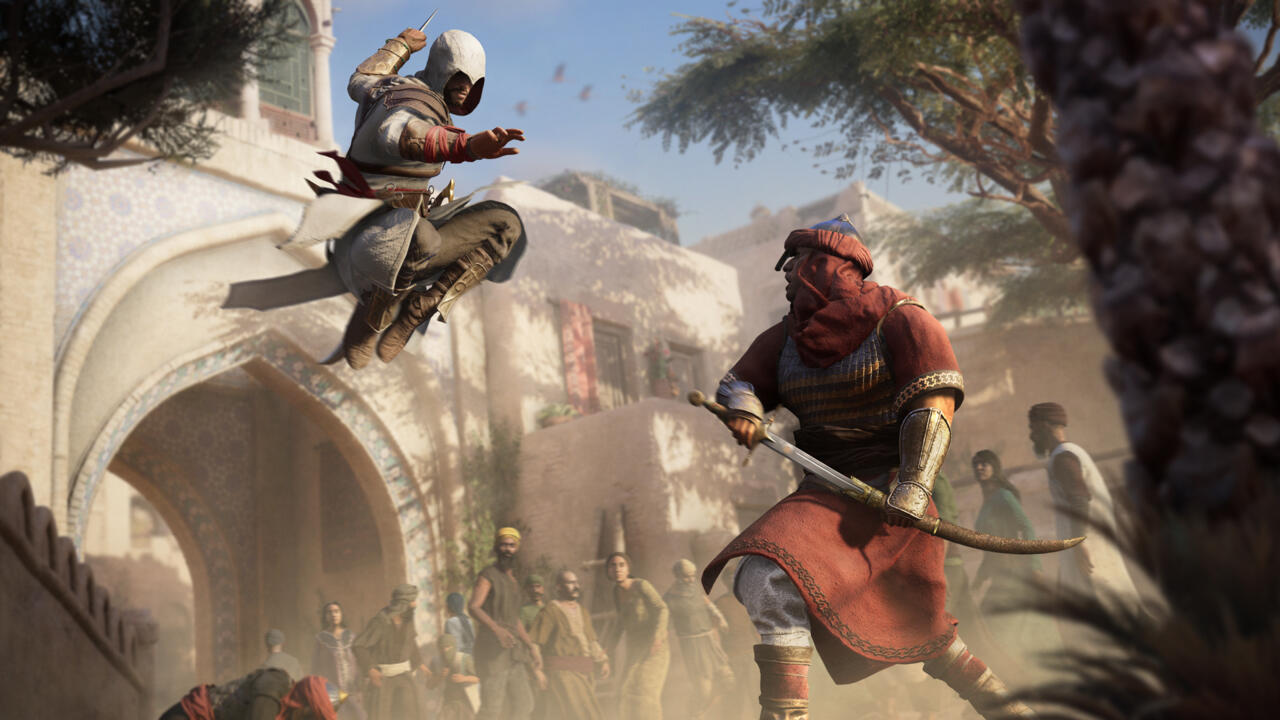
My time with the game wasn't long enough to see this system fully in action--I played the entire preview pretty stealthily--so I'm not sure how this feels in practice but I'm eager to see for myself. I hope it feels like the institutional organizations behind the city are taking note of you and trying harder to stop you, further encouraging you to avoid direct conflicts and play things quietly. I think that would go a long way toward heightening the ongoing threat of the Order of Ancients and making it feel like their presence is trying to constrict the city.
The final part of the open-world segment was an assassination mission, structured like the "Black Box" missions first introduced in Unity. With the benefit of hindsight, you can see how Assassin's Creed was tip-toeing toward something almost akin to 2016's Hitman with these Black Box missions, before ultimately abandoning social stealth for the more action RPG-oriented trilogy of Origins, Odyssey, and Valhalla. Mirage feels like a shift back onto the track that Unity and Syndicate were leading the series to: non-linear assassination missions that can be completed in a number of ways and reward preparation and strategy.
"We have five or six total [Black Box missions] in the game," Arseneault said. "So our goal with these is to focus on our assassination pillar as the main thing. We want an assassination [mission] to feel visceral, so you need to develop a relationship with your target. So this one [you played], because it was the bazaar, we decided to pick the approach of, 'What is the bazaar?' It's a social place, so it's more of a hub. You talk to people, eavesdrop on people, and tail people--those are the mechanics we'd like to play with. Pickpocketing made sense as well. You're going to have different Black Boxes in the game, which will be more about military compounds or other locations that we'll not go into, but each of them has its own twists. It's something that we wanted to do--make them unique, in a sense. The target is unique and the location is unique; therefore, the gameplay and quest [for each Black Box] need to be unique as well."
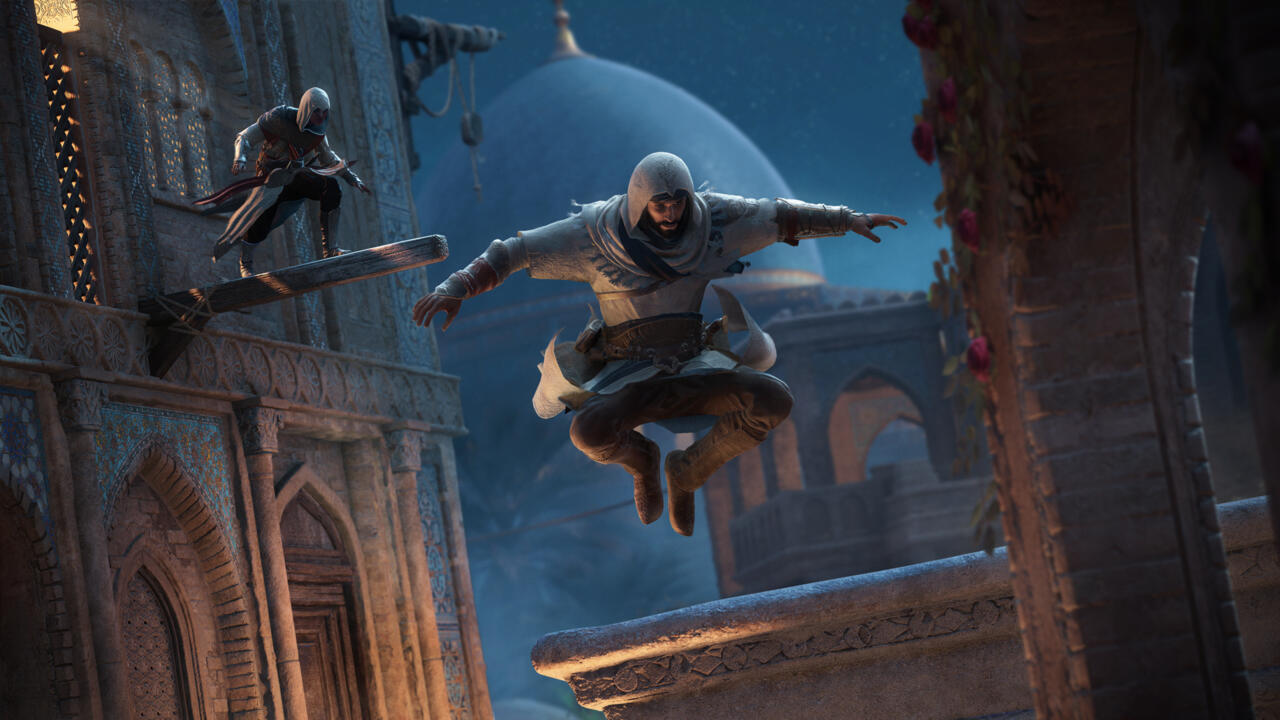
The mission I played saw Basim needing to find clues that would hint at the target's identity, leading me to uncover they would be attending an auction to buy a specific item. When that item was up for bidding, I deduced the target based on the clues I'd uncovered. They didn't have enough to outbid the other people there and neither did I. Following the auction, I snuck into the buyer's private quarters and secured the antique so I could successfully pose as them and sneak into the target's chambers, but I couldn't get past the guard protecting the target as I didn't have the credentials to move through the space. A nearby vendor offered to give me theirs in exchange for money but while I was pickpocketing loose change to meet that price, I overheard that someone had been confiscating those credentials. So I just snuck into their base, killed a few guards to avoid detection, and looted the credentials I needed. That got me into the target's chambers where I pretended I was offering the antique for sale. This lie got me close enough to stab the target in the neck. Unfortunately, I killed them in front of a lot of witnesses so I had to make a frantic escape afterwards.
Though somewhat linear in structure and limited in scope, I'm still impressed by the freedom the level allowed, giving me the room to figure out how to accomplish certain tasks during the Black Box mission instead of outright telling me where to go next every step of the way. I had to actually listen to NPCs to learn clues and figure out what to do next to reach my goal. The game did provide some guidance with some general objective reminders but was largely hands-off, letting me explore and figure out how to reach the target on my own. Overall, the structure is reminiscent of the original Assassin's Creed, where protagonist Altaïr had to deduce his target's identity before going after them. Mirage has you engage in a similar process of collecting clues and deducing a target's identity and then killing them but in the more open-ended structure of hunting down the Cult of Kosmos in Odyssey or Order of Ancients in Valhalla.
"It can feel a little bit similar to the [Cult of Kosmos] or the Order of Ancients in the last two games, but it's part of your main structure," Arseneault said. "So instead of tracking quests, you track cases or track clues or track people, and basically all of those become 'quests.' We just don't always call them quests anymore. So it fudges the line a little bit, but that's also what makes the investigation, detective vibe we tried to create. It's not something where you have quest start, [and then] quest end. You just know, 'Yeah, I'm looking for someone and eventually I will find him, and I will probably kill him,' or it'll unfold into something else. But it's not about a quest start, quest end mentality; it's a little bit more blurry. The focus is the investigation work, trying to group everything together so you can start multiple [investigations] in parallel. You have multiple targets in parallel for you to decide in which order you want to tackle them."

Arseneault continued: "[Mirage], for us, is an homage to the first and second [Assassin's Creed], but the first one especially--[Assassin's Creed 1] had a loop that was very mechanical where you do thing one, thing two, thing three, and then go through the rest [of the targets] the same way. But you take those same ideas, and you put them into more of a new modern [gameplay loop], and it gives you quests that are developed with characters that you meet again and again. So yes, [Mirage] is going back to the roots [of the series] but it's not necessarily copying what was done before. It's getting inspired by what we like [about Assassin's Creed 1] and bringing that to a modern game experience. The actions are there. The structure, not really. The structure [of Assassin's Creed 1] was very, very strict. We have a more open structure which is more modern."
Pointing to the Black Box mission I played as an example, I was told that Basim needed to uncover several clues prior to that mission to unlock it. Additionally, during the Black Box mission itself, I could have played parts of it slightly differently. The outcome is always the same--Basim always uncovers the true identity of the Order of Ancients member and successfully gets his mark--but how I reach that outcome can be different each playthrough. And so already, I'm wondering how much of that mission can change. Could I have circumnavigated most of it if I had enough money on hand to outbid everyone for the antique from the get-go? Is it possible to reach the target without the antique or the credentials on my person? Can I find a way to clear the room of witnesses before killing the target and complete the whole mission with complete stealth? I'm excited to replay the mission to find out and see how consequence-driven the other Black Box missions are.
"Some of [the Black Box missions] are more open-ended," Arseneault said. "This one is mostly linear. There's variety in the number of stuff you can do, like, at the end, you can not role-play and [instead] you can assassinate your target without waiting for your turn in line to talk to the Treasurer. So yeah, those are twists that make it, we feel, more interesting. [The player] is part of how [Basim] is assessing that [target]."
I'm hopeful for Assassin's Creed Mirage--I think it could be one of the best Assassin's Creed games we've had in years. I already enjoy how much of the mechanics and gameplay loops from games like Unity and Odyssey were used to improve upon the already winning structure of the original Assassin's Creed in the part of the game I got to play. Here's hoping that combination lives up to its potential across the entire experience.
Assassin's Creed Mirage is set to launch on October 5 for Xbox Series X|S, Xbox One, PS5, PS4, and PC.
